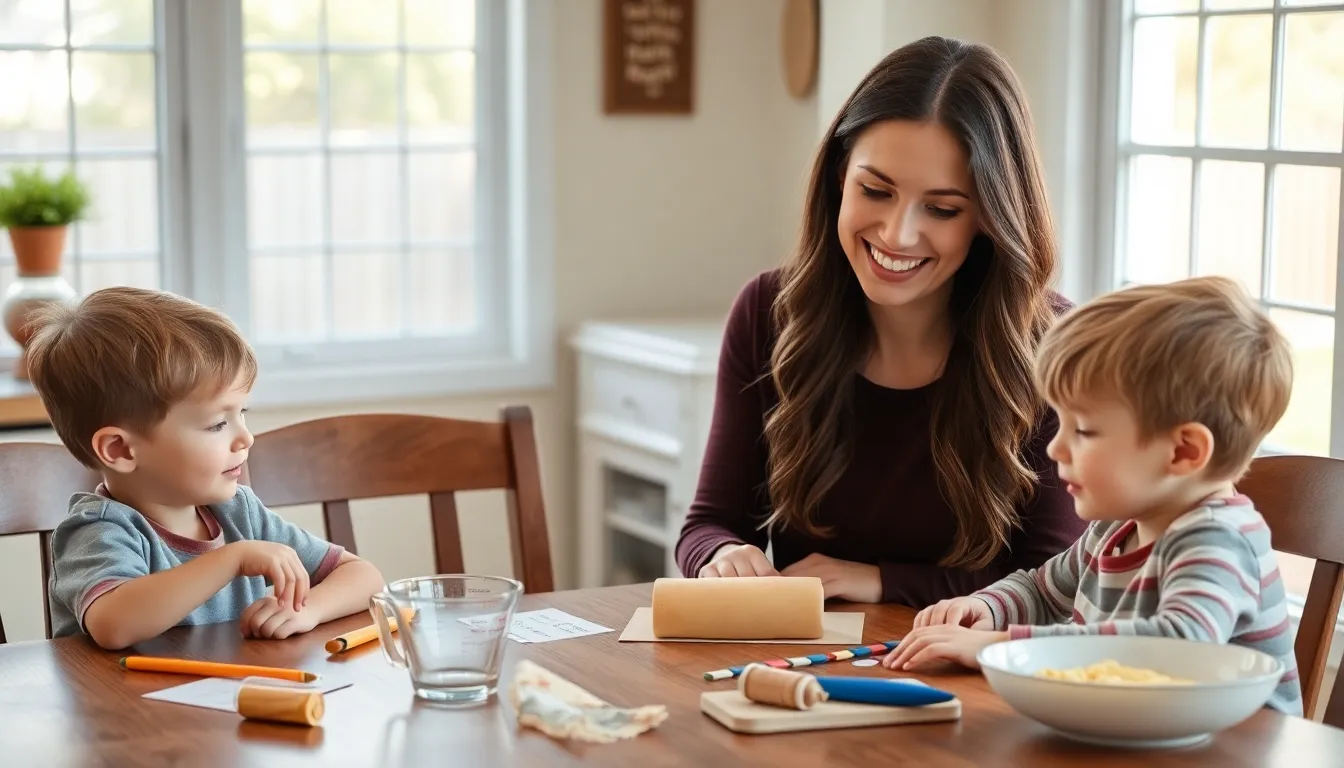In the land of 10,000 lakes, where the winters are long and the summers are short, parents in Minnesota are discovering a new way to educate their kids—homeschooling. It’s not just a trend; it’s a movement that’s gaining momentum faster than a snowstorm in December. With the freedom to tailor lessons to their child’s unique interests and learning styles, families are trading in traditional classrooms for cozy kitchens and backyard classrooms.
Imagine teaching math while baking cookies or diving into history by exploring the local museums. Homeschooling in Minnesota offers flexibility, creativity, and a chance to bond as a family. Plus, who wouldn’t want to avoid the morning rush of packing lunches and searching for lost shoes? As more families embrace this educational adventure, it’s time to explore what makes homeschooling in the North Star State so appealing.
Table of Contents
ToggleOverview Of Homeschooling In MN
Homeschooling in Minnesota has gained momentum as families seek personalized education solutions. Parents tailor curricula to match their children’s interests, leading to deeper engagement and understanding. Unique learning opportunities enhance educational experiences, such as integrating baking into math lessons or leveraging local museums for hands-on history lessons.
Minnesota law supports homeschooling with minimal regulations, allowing families flexibility in their educational approaches. Parents must submit an annual letter of intent and provide instruction in core subjects like reading, math, science, and social studies. Choosing from various homeschooling methods, families can adopt structured programs or develop unschooling techniques based on personal philosophies.
Participation in homeschooling co-ops further enriches learning by connecting families who share resources, expertise, and social interactions. These co-ops foster community connections, allowing students to participate in group activities, field trips, and collaborative projects. Additionally, Minnesota offers support through various online and brick-and-mortar resources, guiding families through legal requirements and curriculum options.
Flexibility in scheduling sets homeschooling apart from traditional schooling. Families often enjoy the liberty to set their learning pace, allowing for exploration beyond conventional classroom boundaries. Outdoor education, community service, and travel create valuable experiences that enhance children’s understanding of the world.
As the appeal of homeschooling continues to rise, it reflects a broader shift in educational preferences. Families pursuing this alternative approach often cite a desire for less stress and more control over their children’s educational journey. Engaging in homeschooling fosters a supportive environment where children thrive academically, socially, and emotionally.
Legal Requirements For Homeschooling In MN

Homeschooling in Minnesota involves specific legal requirements. Parents must register with their local school district to start the homeschooling process.
Registration Process
The registration process for homeschooling includes submitting an educational plan to the school district. This plan needs to outline the curriculum and subjects being taught. The state mandates this plan be submitted annually, ensuring compliance with educational standards. Parents should provide a written notice of intent to homeschool, which should include their child’s name, birthdate, and educational goals. After registration, families often enjoy the freedom to tailor their educational experiences according to individual needs.
Educational Materials
Minnesota law requires instruction in specific core subjects, including reading, math, science, and social studies. Parents can select educational materials that align with their teaching styles and children’s learning preferences. Numerous resources are available, including online courses, textbooks, and community classes. Families often choose from a range of curricula, allowing them to incorporate hands-on learning activities or classical education methods. This flexibility supports diverse educational goals while adhering to state standards.
Benefits Of Homeschooling In MN
Homeschooling in Minnesota offers significant advantages for families. Parents enjoy the ability to mold the educational environment to suit their children’s needs.
Customized Learning Experience
Personalized education emerges as a core benefit of homeschooling. Families design curricula based on individual interests and learning styles. Children engage deeply with subjects when they relate to personal experiences, whether through hands-on projects or community activities. Utilizing diverse resources, including online classes and field trips, enhances their learning journey. Each child progresses at their own pace, allowing mastery of subjects before moving forward. Parents and children collaborate to create engaging lessons that inspire a love for learning.
Flexibility And Freedom
Flexibility characterizes homeschooling in Minnesota. Families control their schedules, allowing for adjustments during the year. This adaptability lets them capitalize on weather, community events, and travel opportunities. Families often choose to complete lessons at times that align with their natural rhythms, whether early mornings or late afternoons. This freedom reduces stress, as parents navigate their children’s unique developmental and educational needs. Time traditionally spent commuting to school can instead serve for enriching activities, such as community service or outdoor exploration, fostering engaging and meaningful educational experiences.
Challenges Of Homeschooling In MN
Homeschooling in Minnesota presents various challenges that families often navigate. Time management is a crucial aspect to consider.
Time Management
Managing educational activities demands significant organization. Families must allocate appropriate blocks of time for each subject while balancing household responsibilities. Setting a consistent schedule ensures that learning occurs regularly, but flexibility is also important to accommodate real-life events. Parents often find it beneficial to plan lessons in advance, minimizing stress and maximizing productivity. Over time, families may adjust their routines based on what methods yield the best results. Additionally, dedicating specific days for co-op meetings or field trips helps enhance the educational experience and encourages engagement.
Socialization Concerns
Socialization emerges as a major concern for many homeschooling families. Meeting peers outside traditional school settings is essential for children’s development. Participating in co-ops or local extracurricular activities offers significant opportunities for social interaction. Joining clubs or sports teams can also help foster friendships and encourage teamwork. Families sometimes seek out community events, playdates, or other gatherings to ensure their children develop social skills. Balancing academics with social experiences provides a well-rounded education that addresses children’s needs beyond the curriculum. Understanding and mitigating these concerns can enhance the overall homeschooling experience.
Resources For Homeschooling In MN
Homeschooling families in Minnesota benefit from various resources designed to support their educational journeys. Accessing these resources enhances learning experiences and provides connections among families.
Support Groups
Support groups play a vital role in homeschooling communities. Local organizations offer opportunities for families to share resources, ideas, and experiences. Parents can join groups like the Minnesota Homeschoolers’ Alliance, which provides networking events, workshops, and social gatherings. These communities foster collaboration and encouragement. Additionally, many groups organize field trips and co-op classes to enrich learning. Finding like-minded families helps overcome challenges associated with homeschooling while creating lasting friendships.
Online Tools And Curriculum
Various online tools and curricula are available for Minnesota homeschooling families. Websites like Khan Academy and Time4Learning offer comprehensive educational content across subjects. Many families use these platforms to supplement their teaching. Additionally, resources like Homeschool Planet provide customizable lesson planning tools to streamline organization. Families can also find free educational materials at sites like Teachers Pay Teachers. Utilizing these online options empowers parents to tailor their children’s education while ensuring engagement and accessibility.
Homeschooling in Minnesota presents a unique opportunity for families to create personalized educational experiences that cater to their children’s needs. With its supportive laws and minimal regulations, parents can design curricula that spark interest and foster creativity.
The flexibility of homeschooling allows families to explore diverse learning environments and adapt their schedules to enhance educational engagement. While challenges like time management and socialization exist, local co-ops and community activities provide essential support and connections.
As more families embrace this educational path, the benefits of homeschooling continue to shine, making it a viable option for those seeking a tailored approach to learning.

